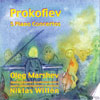Prokofiev Piano Concertos Nos 1 - 5
You can’t fault the playing, but where’s that larger-than-life quality?
View record and artist detailsRecord and Artist Details
Composer or Director: Sergey Prokofiev
Genre:
Orchestral
Label: Danacord
Magazine Review Date: 12/2005
Media Format: CD or Download
Media Runtime: 138
Mastering:
Stereo
DDD
Catalogue Number: DACOCD584/5

Tracks:
| Composition | Artist Credit |
|---|---|
| Concerto for Piano and Orchestra No. 1 |
Sergey Prokofiev, Composer
Niklas Willén, Conductor Oleg Marshev, Piano Sergey Prokofiev, Composer South Jutland Symphony Orchestra |
| Concerto for Piano and Orchestra No. 2 |
Sergey Prokofiev, Composer
Niklas Willén, Conductor Oleg Marshev, Piano Sergey Prokofiev, Composer South Jutland Symphony Orchestra |
| Concerto for Piano and Orchestra No. 3 |
Sergey Prokofiev, Composer
Niklas Willén, Conductor Oleg Marshev, Piano Sergey Prokofiev, Composer South Jutland Symphony Orchestra |
| Concerto for Piano and Orchestra No. 4 (for left-hand) |
Sergey Prokofiev, Composer
Niklas Willén, Conductor Oleg Marshev, Piano Sergey Prokofiev, Composer South Jutland Symphony Orchestra |
| Concerto for Piano and Orchestra No. 5 |
Sergey Prokofiev, Composer
Niklas Willén, Conductor Oleg Marshev, Piano Sergey Prokofiev, Composer South Jutland Symphony Orchestra |
Author: David Fanning
Azerbaijan-born Oleg Marshev has been cutting swathes through the Russian repertoire for Danacord in the past decade or so, producing a succession of impressively well prepared and intelligent recordings. On occasions, as with his Shostakovich concertos, he has shown a touch of extra flair that lifts him alongside the very best; at other times, as with his Rachmaninov concertos, things haven’t sparked so well. His Prokofiev strikes me as pretty much bang in the middle.
Who could not admire the shapeliness and aplomb Marshev brings to every phrase of these pages, teeming with notes as they are, and his unforced but never underpowered characterisation? Who could not take pleasure from the beautifully prepared accompaniments supplied by Niklas Willén and his anything-but-provincial-sounding orchestra, captured in splendid detail on warm, well balanced recordings?
To say that Marshev has technique to spare is meant as a high tribute. But in this pre-eminently show-off repertoire it also represents a slight dereliction of duty. Ultimately there is a little too much of the final-rehearsal feel to these accounts, their superb lucidity offered as an end in itself, whereas it should surely be the means.
Shouldn’t there be something more brashly self-assertive about Prokofiev’s debut concerto, and a touch of sauciness to keep the balance? Shouldn’t the Second tell a more riveting story from the outset and reach for the stars in the mother of all first-movement cadenzas? Couldn’t the extremely popular Third trade in a little technical finesse and dare to push the voltage into the red zone? Wouldn’t it be better to search out the Fourth Concerto’s Prodigal Son-like lyricism more probingly, and to draw more vivid characters in the Fifth? It’s by dint of larger-than-life qualities such as these – never pushed over the border into mannerism, as with certain other recorded accounts that have flared brightly and briefly – that Ashkenazy and Previn have remained at the forefront for 30 years.
Who could not admire the shapeliness and aplomb Marshev brings to every phrase of these pages, teeming with notes as they are, and his unforced but never underpowered characterisation? Who could not take pleasure from the beautifully prepared accompaniments supplied by Niklas Willén and his anything-but-provincial-sounding orchestra, captured in splendid detail on warm, well balanced recordings?
To say that Marshev has technique to spare is meant as a high tribute. But in this pre-eminently show-off repertoire it also represents a slight dereliction of duty. Ultimately there is a little too much of the final-rehearsal feel to these accounts, their superb lucidity offered as an end in itself, whereas it should surely be the means.
Shouldn’t there be something more brashly self-assertive about Prokofiev’s debut concerto, and a touch of sauciness to keep the balance? Shouldn’t the Second tell a more riveting story from the outset and reach for the stars in the mother of all first-movement cadenzas? Couldn’t the extremely popular Third trade in a little technical finesse and dare to push the voltage into the red zone? Wouldn’t it be better to search out the Fourth Concerto’s Prodigal Son-like lyricism more probingly, and to draw more vivid characters in the Fifth? It’s by dint of larger-than-life qualities such as these – never pushed over the border into mannerism, as with certain other recorded accounts that have flared brightly and briefly – that Ashkenazy and Previn have remained at the forefront for 30 years.
Discover the world's largest classical music catalogue with Presto Music.

Gramophone Digital Club
- Digital Edition
- Digital Archive
- Reviews Database
- Full website access
From £8.75 / month
Subscribe
Gramophone Full Club
- Print Edition
- Digital Edition
- Digital Archive
- Reviews Database
- Full website access
From £11.00 / month
Subscribe
If you are a library, university or other organisation that would be interested in an institutional subscription to Gramophone please click here for further information.




